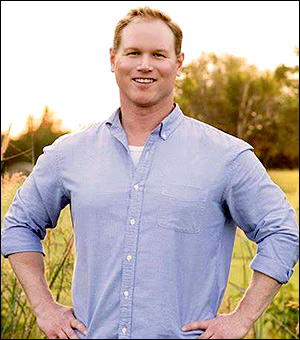
Freshman Rep. Steve Watkins (R-Topeka)
Oct. 17, 2019 — Former legislative aide Abbie Hodgson, the only announced Democratic candidate in the KS-2 congressional race, withdrew her challenge to freshman Rep. Steve Watkins (R-Topeka) Wednesday because she claims not to possess the fundraising ability to conduct a credible campaign. At this point, there is no alternative Democrat on the horizon in the Kansas district, but that will soon likely change.
Rep. Watkins won a tight 48-47 percent general election victory over former state House Minority Leader and 2014 gubernatorial nominee Paul Davis (D) last November to succeed retiring Rep. Lynn Jenkins (R). This came after political newcomer Watkins, a West Point graduate, Army Ranger and Afghanistan veteran, won a tight seven-way Republican primary but with only 26.5 percent of the vote. Controversy arose when a major independent expenditure committee emerged, which was principally funded by the candidate’s father, to back Watkins.
More potential upheaval surrounds Rep. Watkins, but it simmers below the surface. Rumors were flying around in August that the congressman would imminently resign his office because of a rumored scandal that was about to become public. Watkins took no such action, and to date nothing involving scandalous activity has come to light.
This has not stopped certain Republicans from taking action, however. In early September, reportedly at the behest of former Gov. Jeff Colyer (R) who lost his own bitter primary to then-Secretary of State Kris Kobach, state Treasurer Jake LaTurner made a surprising move. He was the first declared US Senate candidate after incumbent Pat Roberts (R) announced his retirement, but he then transferred from the statewide campaign to instead enter the primary to challenge Watkins in the Topeka-anchored congressional district.
Kansas’ 2nd is a decidedly Republican seat, but not intensely so. The CD occupies 23 eastern Kansas counties and parts of two others. It runs vertically from the Nebraska border to Oklahoma and consumes the territory between the Kansas City metro area and Wichita.
After Democrat Nancy Boyda upset then-Rep. Jim Ryun (R) in 2006, she would lose to Jenkins, then the state’s treasurer, two years later. Rep. Jenkins subsequently held the seat for five terms, averaging 57.7 percent in her elections including a 50.6 – 46.6 percent challenger victory over Rep. Boyda. President Trump won a 56-37 percent victory here in 2016, which is consistent with Jenkins’ margins. Mitt Romney also topped President Obama here in 2012, but with a narrower 55-42 percent spread. John McCain also carried the 2nd in 2008 against then-Sen. Obama, but his winning percentage was even smaller, 53-45.
With an Aug. 4 primary and a June 1 candidate filing deadline, this budding contest has much time to formulate. And, with the Kansas Republicans headed to what could become a divisive and bitter primary battle in their 2nd District, Democrats could be in position to take advantage of the chaos during a short general election cycle.
Therefore, it is obvious that the party leadership will re-double their efforts to find a candidate especially since the CD has previously elected a House Democrat (Boyda in 2006), voted for Democratic gubernatorial candidate (and now governor) Laura Kelly last November, and recalling that Davis came within a point of overtaking Watkins.
While the vast majority of 2020 congressional primaries involve Democratic challenges, this is a Republican contest that clearly bears watching.
